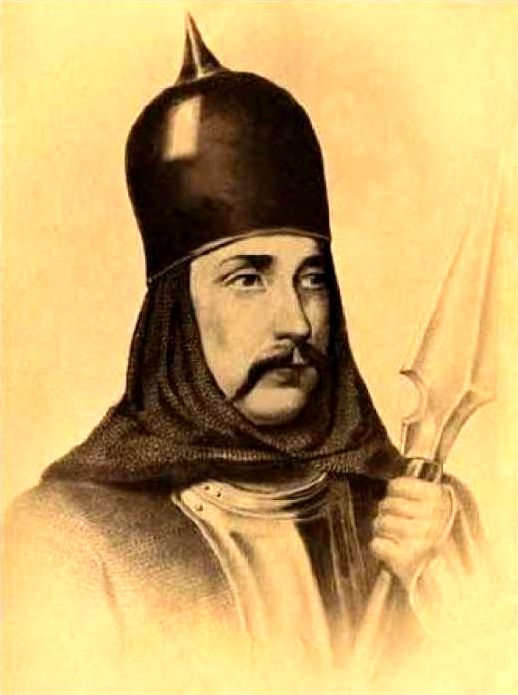Вещий Олег Oleg the Seer 879-912
Вещий Олег Oleg the Seer 879-912

Олег получил престол в 879 году после смерти Рюрика как старший в роду. Три года прокняжил он в Новгороде, а затем двинулся в завоевательный поход на юг, вдоль водного пути из Балтийского моря в Черное — пути «из варяг в греки». Летописи утверждают, что Олег прославился победами, благоразумием и любовью подданных. Он присоединил к княжеству древние города Смоленск и Любеч, а в 882 году захватил богатый город Киев, убив княживших там бояр Аскольда и Дира, и перенес в Киев столицу.
Олег утверждал в завоеванных областях свою власть и строил города. Ратные успехи послужили толчком к новым завоеваниям. В 907 году Олег двинулся на православный Константинополь (Царьград). Он покорил эту могущественную столицу Византии, обложил ее данью, заключил выгодный для Руси мир, и, прибив свой щит на ворота Царьграда, вернулся в Киев. В знак признания княжеских боевых заслуг и мудрости правителя народ стал именовать Олега «Вещим», то есть знающим будущее, провидцем.
Олег княжил 33 года, окруженный славой и признанием подданных, присоединил много земель и племен и умер в глубокой старости в 912 году.
Oleg ascended the throne in 879 on the death of Rurik, as a senior in the family. For three years he ruled in Novgorod, and then launched an aggressive campaign to the south, along the waterway from the Baltic to the Black Sea known as the «Route from Varangians to the Greek». The chronicles said that Oleg gained his glory due to his victories, prudence, and love of his subjects. He joined to his principality the ancient cities of Smolensk and Lyubech, and in 882, captured the wealthy city of Kiev, killed the boyars Askold and Dir who ruled there, and moved his capital to Kiev.
Oleg took control over the conquered areas and built the cities there. Martial successes gave the impetus to the new conquests. In 907, Oleg ventured a raid against the Orthodox Constantinople (Tsargrad, or King City as called by the Slavonic). He conquered this mighty capital of the Byzantine Empire, laid a tribute on it, made a peace treaty profitable for Rus, and nailed his shield at the gates of Constantinople; then he parted for Kiev. In recognition of the prince’s military merits and wisdom of the ruler, the people called him «Oleg the Seer», i. e., a wise one knowing the future, a prophet.
Oleg reigned for 33 years, enjoying the fame and recognition of his subjects, annexed many lands and tribes, and died at the ripe old age in 912.
Более 800 000 книг и аудиокниг! 📚
Получи 2 месяца Литрес Подписки в подарок и наслаждайся неограниченным чтением
ПОЛУЧИТЬ ПОДАРОКДанный текст является ознакомительным фрагментом.
Читайте также
85. ВЕЩИЙ ОЛЕГ
85. ВЕЩИЙ ОЛЕГ О Вещем Олеге — древнерусском князе, жившем в IX–X веках, сообщают древние летописи, его имя упоминается в исторических документах, но большинство сведений о его жизни и деятельности дошли до нас в виде народных сказаний, в которых реальные события тесно
ОЛЕГ ПЕНЬКОВСКИЙ
ОЛЕГ ПЕНЬКОВСКИЙ Из всех советских граждан, передававших когда-либо секретные сведения на Запад, наиболее высокопоставленным и, бесспорно, самым благородным был полковник Олег Пенъковский. Кристофер Добсон, Рональд Пейн. «Словарь шпионажа» В лабиринтах американской
Олег Попов
Олег Попов Глаза то озорные, то печальные… Широкий жест, улыбка до ушей… Нос — помидором, волосы мочальные, Он взрослых превращает в малышей… Это строчки из стихотворения Леонида Георгиевича Куксо «Буффонный клоун». Знаменитый комик, много лет проработавший на арене,
О чем говорить с девушкой (Валерий Ямшанов, Олег Боярский, Олег Рохлин, Дмитрий Горбачев)
О чем говорить с девушкой (Валерий Ямшанов, Олег Боярский, Олег Рохлин, Дмитрий Горбачев) Когда девочке 5 лет, ты рассказываешь ей сказку и отправляешь в постель. В 10 лет она сама себе рассказывает сказки, отправляясь в постель. В 15 лет она рассказывает маме сказки про то,
ОЛЕГ ПЕНЬКОВСКИЙ
ОЛЕГ ПЕНЬКОВСКИЙ В 1955 году в Анкаре офицеры западных армий частенько видели помощника военного атташе Советского Союза полковника Олега Пеньковского сидящим в дешевом кафе с несчастным видом и отрешенным взглядом. Исходя из этого не очень значительного факта,
Олег
Олег Олег – первый князь киевский из рода Рюрика. Летопись говорит, что Рюрик, умирая, передал власть родственнику своему О., так как сын Рюрика, Игорь, был в то время малолетним. По предположению Соловьева, О. получил власть не как опекун Игоря, а как старший в роде. Три года
Олег Кассини
Олег Кассини (1913–2006)У него было русское имя, итальянская фамилия, родился он во Франции, а знаменитым модельером стал в США. В немалой степени именно ему первая леди Америки, Жаклин Кеннеди, обязана своим стилем, который восхищал женщин во всём мире. Его биография была
Олег ДЕГТЯРЕВ
Олег ДЕГТЯРЕВ Певец, музыкант, автор песен, звукорежиссер и вдобавок инструктор по восточным боевым искусствам, Олег Дегтярев никогда не стремился к особой публичности, хотя его творчество, несомненно, заслуживает внимания широкой аудитории.Он родился 8 декабря
ЛАНЯК, Олег
ЛАНЯК, Олег диджей радио «Западный полюс» (Ивано-Франковск, Украина) 23 Разом нас багато – / Нас не подолати! <…> Ющенко – так! / Це – наш президент. // Вместе нас много – / Нас не одолеть! <…> Ющенко – да! / Это – наш президент. «Разом нас багато…», песня группы
ОЛЕГ ЧУХОНЦЕВ
ОЛЕГ ЧУХОНЦЕВ Чухонцев Олег Григорьевич родился 8 марта 1938 года в Павловском Посаде Московской области в семье служащего. Окончил факультет русского языка и литературы МОПИ (1962). Работал в журналах «Юность», «Новый мир».Печатается с 1958 года: журнал «Дружба народов».
ШМЕЛЕВ, Олег (Грибанов, Олег Михайлович, 1915—1992); ВОСТОКОВ, Владимир (Петроченков, Владимир Владимирович, 1915—?), сотрудники КГБ, писатели
ШМЕЛЕВ, Олег (Грибанов, Олег Михайлович, 1915—1992); ВОСТОКОВ, Владимир (Петроченков, Владимир Владимирович, 1915—?), сотрудники КГБ, писатели 73 Ошибка резидента.Загл. повести (1966); экраниз. в 1968 г., реж. В.